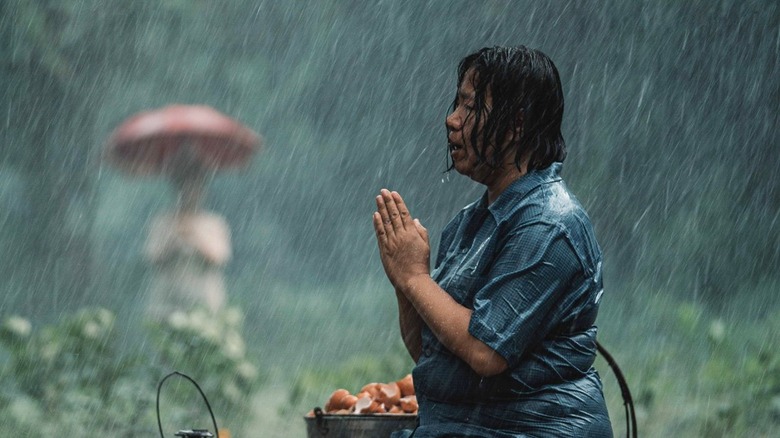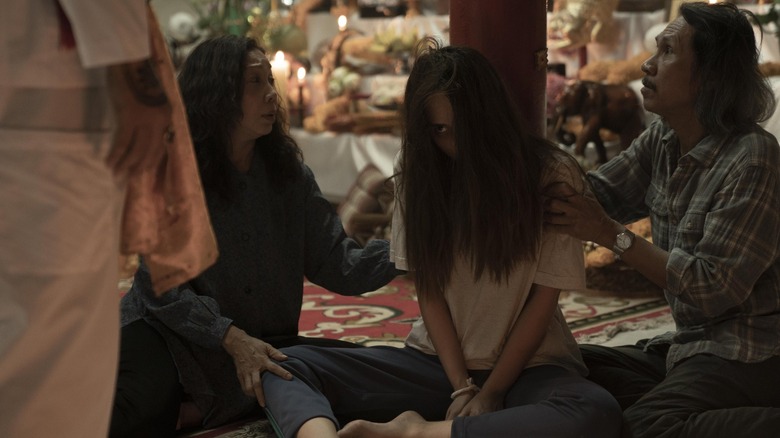
There's a point in William Peter Blatty's incendiary 1971 horror novel "The Exorcist" when Father Karras asks Father Merrin what the purpose of possession might be -- if, according to their religion, a demon cannot touch a victim's will. Merrin considers this question, then thoughtfully replies:
"I think the demon's target is not the possessed; it is us ... the observers ... every person in this house ... I think the point is to make us despair; to reject our own humanity, Damien: to see ourselves as ultimately bestial; as ultimately vile and putrescent; without dignity; ugly; unworthy. And there lies the heart of it, perhaps: in unworthiness. For I think belief in God is not a matter of reason at all; I think it finally is a matter of love; of accepting the possibility that God could love us".
Most people forget that Blatty wrote "The Exorcist" as a testament to the existence of Jesus Christ: a way to prove that Christianity is real and valid; for if the devil is real, so too is his foil. Surprisingly effective, this idea of whether or not god loves us is at the heart of Banjong Pisanthanakun's "The Medium." In a surprising turn of events, the concept of not being worthy of god's love proves to be more horrific than any ghost or any demon.
Whether or not Nim (Sawanee Utoomma) is actually the chosen Shaman for Ba Yan, the deity whose involvement in her family's life has been passed down from generation to generation, is up for debate. But in the moment, I totally bought into the idea that she is the mouth through which her god speaks. In its vaguely familiar premise, "The Medium" isn't that different from any of the other demonic possession movies. But unlike so many others that have come before, it has a tangible, authentic quality: You can smell the incense, you can feel the rain, you can taste the stench of malevolence in the air.
When we first see Nim, she's speaking with the cameramen of this mockumentary, explaining why she's chosen to aid the afflicted through various rituals rather than spend quality time with her kin. A loner by nature, aloof and focused on her craft, Nim's decision to dedicate all of her time to the god Ba Yan -- even when she visits her loved ones for a funeral, they berate her for her absence – offers even more opportunities for ostracization and faux pas. The tightly-knit family, headed by Nim's sister Noi (Sirani Yankittikan) and her daughter Mink (Narilya Gulmongkolpech), don't quite know what to do with this awkward outsider. Nim has religious explanations for things they recognize as folklore and myths. To her family, Nim represents all of the things they'd rather leave in the past.
It's Not Easy Being A Shaman

But Pisanthanakun doesn't exaggerate this divide. Instead, he uses it to mold and shape his characters, as when Noi explains to the documentary crew that the god Ba Yan did try to possess her when she was younger, relaying the depths of the "shaman fever" she experienced during that period -- with symptoms like prolonged migraines and months-long, non-stop menstruation -- and her decision to reject her traditional god in favor of Christianity. Upon hearing her side of the story, it makes sense why a young girl would fear letting such power into her heart. It also helps illustrate how despite Nim's alienation, her decision to take her sister's place and be the shaman for the family actually solidifies her love for the people who reject her the most.
Yet nothing compares to the trials and tribulations that lie in wait. Soon, Mink starts acting peculiar, going off on violent rants, sleepwalking, and staring down blind old ladies who coincidentally fall terminally ill the following day. It's not long before her transgressions sharply escalate into full-on outbursts and twisted behavior as she grows more feral, crawling around on all fours, attacking people, and delighting in others' misfortune. Although initially hesitant to allow the shaman craze to touch her offspring, Noi begins fearing for her daughter's life, and commands her sister to begin the ceremony for Mink to accept Ba Yan into her heart. But this is no deity. Nim found the Pa Ta Ba in Mink's closet. She has watched as the spirits of vengeance have gathered within Mink's chest. Ba Yan isn't the one seeking to possess her niece -- this parasite is a demon.
Teamed up with the co-writer and producer of 2016's "The Wailing," Na Hong-jin, Pisanthanakun carves out a name for himself as a standout genre director by avoiding the pitfalls of typical exorcism movies. In place of cheap scares and by-the-book beats, there's foundational trauma, brutal testing of blood ties, and a deep rooted connection to nature. A notion of equality in the same quantum fields across the board, not unlike Schrödinger's equation. There are spirits all around us, and though all may not mean us harm, the ones that do seek to shake us of our devotion to a higher power and prove in their rage our own pointlessness. It is this rambunctious shaking up of the status quo that lends to the greatness of "The Medium." And it is this suggestion of unworthiness that haunts the viewer to their core.
Read this next: 14 Korean Horror Movies You Need To See
The post The Medium Review: This Exorcism Movie Will Haunt You to Your Core [Telluride Horror Show 2021] appeared first on /Film.
from /Film https://ift.tt/3CwMriN
via IFTTT
Comments
Post a Comment